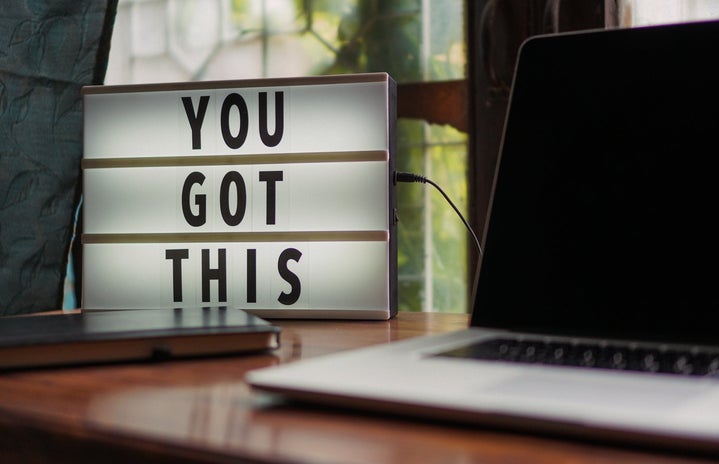Productivity isn’t something that’s taught in school, but the funny thing is is that schools always expect students to be productive. Learning how to not procrastinate is definitely an essential life skill for all college students–we all have so much to do, and so little time to do it! But making a difference in efficiency is much easier said than done. How are we supposed to do it? Well, we can start by understanding that productivity is a process. It’s something that can only be improved through doing various little things that end up making a big difference.
I will say, researching and writing this article made me take a step back and really think about how I can become more productive in my own life. Reading different articles, hearing what other college students have to say, and analyzing my own habits are all things that helped me learn more about becoming a more efficient student and worker. So, here are five little changes that can make a big difference in your productivity.
- Get organized
-
Organization and productivity go hand in hand. In order to do what you need to get done, you have to know how you plan on doing it. A study from Princeton University’s Neuroscience Institute found that environmental factors – such as a cluttered space – can greatly affect a person’s ability to focus. Being disorganized can quite literally limit your productivity. To combat this, try planning a weekly or monthly desk clean-up, or clean up your work area on a snack break. Do whatever it is you need to do to keep your space neat. Believe me, it’ll help organize that scattered to-do list in your mind, too!
Not only is it important to have an organized space to work in, but it’s also important to know how you’re organizing the tasks you have to get done. Star, a senior at Loyola Marymount University, shares how she stays organized and productive throughout the school year: “I use bullet journaling as a way of staying organized while also de-stressing during my busy weeks. Especially at school, where life can get very hectic very fast, I like to take 30 minutes to an hour each week organizing my life. I plan out and draw weekly schedules, keep track of my finances, and make sure I’m tracking my water intake. Bullet journaling is a therapeutic outlet for me to plan my schedule and make sure I’m on top of my homework each week.”
So, what if bullet journaling isn’t your thing? Totally okay! You could try making simpler to-do lists, writing out your various tasks in a planner, creating a calendar, making goal sheets, or even downloading a productivity app on your phone. Getting organized can be overwhelming, but it doesn’t have to be! And, after you do have everything in order, you’ll find it much easier to get things done.
- Work on one thing at a time
-
One thing I for sure thought would be my superpower in college is my ability to multitask, but I was quickly proven very, very wrong. Yes, it’s fun and rewarding to be involved in a bunch of different extracurriculars in college, but what if you can’t manage all the different things you have on your plate? According to a research-based Forbes article, multitasking can reduce productivity by up to 40%. This is where the art of single-tasking comes into play. Through prioritizing one thing at a time, your brain will be able to focus better on the task at hand and ultimately allow you to move faster down the list of things you need to get done.
Calyssa, a sophomore at Oklahoma University, shares how she boosts her productivity by tackling one thing at a time: “My biggest tip for productivity is taking your to-do list and breaking it down into the most important to the least important, that way you can chip away at your homework or tasks one at a time and keep from getting overwhelmed,” she says. “I always get super stressed looking at my huge list of things to do, but as soon as you take that first step, everything gets so much easier.”
Another tip that’ll surely give you and your productivity a boost is making not-to-do lists. Certain things just don’t need to get done, but we do them anyways as a means of putting off what we really should be doing. For example, when I was writing this very article, I decided the floor needed to be vacuumed (which it definitely did, I just didn’t need to do it right then)! Making a list of the things that can wait to get done is a great motivational tool to help keep you focused.
- Take breaks (mindfully)
-
Stopping your work and taking regular breaks may sound unreasonable, but it’s actually been proven to boost productivity through helping with creativity, memorization, and concentration. How long you want to make your time off is completely up to you; it’ll probably depend on your tasks. But be sure to put self-care at the center of these little breaks, too! Refreshing and refueling is essential for both your mental health and work ethic, and you’re sure to feel more ready to get things done afterwards.
Jackie, a freshman at the University of Michigan, offers advice on how taking breaks has benefitted her productivity levels this school year. “I always try to make my breaks meaningful! Instead of doing something aimless like scrolling through social media for 30 minutes, I try to designate my breaks to be something productive in another area of my life besides academics,” she says. “For me, this might be something like calling my mom, going to the gym, making a snack, doing my dishes, or completing any other small task that’s on my to-do list!” Remember, without a “stop” there wouldn’t be a “go”, so take those breaks and then get back to your work.
- Ditch the distractions
-
Everyone has that “thing”. You know, the thing you do when you’re hardcore procrastinating and really just can’t seem to focus. For some, it might be online shopping. For others maybe it’s playing video games. For most, it’s probably getting lost in an endless scroll on your different social media feeds. Whatever your biggest distraction is, it’s important to allocate a proper time and place for it. Like I mentioned earlier, taking breaks isn’t a bad thing. They really are an important factor in boosting productivity. So, maybe add your distractions – digital or non-digital – into your designated break times! That way, those long phone scrolls and online shopping sprees become rewards instead of distractions.
Giana*, a junior at Indiana University, shares a tip for how to ditch distractions and be more productive while doing schoolwork. “My phone is definitely one of my biggest distractions when I’m trying to focus on my work,” she says. “What I normally do to prevent myself from scrolling through social media or checking my texts is something so simple yet so effective: I turn off all of my notifications and put my phone out of arm’s reach. Restricting myself from instinctively grabbing my phone when schoolwork seems too hard has really helped me power through tough study sessions.” So, set those distractions aside! It’ll make it even more fun to get lost in them again when you finish up your work.
- Fuel up on sleep!
-
My mom said this to me every night of high school (and still says it whenever she gets the chance on the phone) but it’s so true: get a good night’s sleep! I know, I know–college is where healthy sleep schedules go to die. But if you’re really serious about increasing your productivity, sleep is the ultimate answer. Of course, eating healthy and balanced meals are important too, but sleep seems to be something almost all college students are deficient in.
The more Z’s you get at night, the more A’s you’ll get in school! (Disclaimer: this is not a scientifically proven fact, but I do know getting a healthy amount of sleep will help increase your productivity and ability to stay focused, which in turn can help you better complete your schoolwork). The American Sleep Association recommends getting 7 to 9 hours of sleep a night, as these hours of rest are crucial to the mental and physical health of human beings. According to a study conducted by Harvard, sleep deprivation not only slows down productivity, but it can cause you to make more errors as well.
Alexis, a sophomore at Loyola Marymount University, speaks on how important sleep is while in school: “I would say sleep is the biggest secret to improving your productivity,” she says. “A lot of people just drown themselves in coffee or in caffeinated drinks to maintain energy throughout the day, but there’s just no substitute for sleep! It hasn’t been easy, but I do make a point to get at least 7-8 hours of sleep a night…even if that means missing a social function or a party every once in a while.” It can be very hard to do, but getting those 7 to 9 hours really is important. Not getting enough sleep can drastically affect your body. So, even if you have to start by taking small naps throughout the day, be sure you’re getting enough rest!
Making changes to boost your productivity while in college isn’t something you have to do, but it can be really fun and helpful to try! You don’t even have to completely reorganize your life to begin noticing changes. As you become more and more productive, different areas of your life will become more and more grateful. So, go! Turn that procrastination into productivity, and know that I’m right there with you.
*name has been changed


